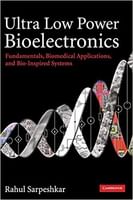- Undergraduate
Bachelor's Degrees
Bachelor of ArtsBachelor of EngineeringPartner School Dual-DegreeUndergraduate AdmissionsUndergraduate Experience
- Graduate
Doctoral Degrees
Doctor of PhilosophyPhD Innovation ProgramDoctor of Medicine-PhDGraduate AdmissionsGraduate Experience
- Research
- Entrepreneurship
- Community
- About
-

Rahul Sarpeshkar
Professor of Engineering
Thomas E. Kurtz Professor
Professor of Microbiology & Immunology
Professor of Physics
Professor of Molecular & Systems Biology
Chair, Neukom Cluster of Computational Science
Office: Vail 507A, Geisel School of Medicine
Overview
Professor Sarpeshkar's interdisciplinary research uses analog circuits and analog computation as a universal language to design advanced quantum, bio-molecular, and nano-electronic circuits and systems, from atom to living cell. These systems are experimentally implemented in living synthetic microbial DNA-RNA-protein circuits in his wet lab, and in nano-electronic supercomputing chips that emulate or are inspired by biological and quantum computation in his dry lab. His fundamental work has been applied to implantable medical devices, synthetic biology, systems biology, neural prosthetics, bio-inspired, and ultra-energy-efficient systems. His research group members have originated from a wide variety of disciplines including physics, bioengineering, microbiology, computer science, and analog circuit engineering.
Sarpeshkar is Dartmouth's inaugural Thomas E. Kurtz Professor and Chair of the Neukom Computational Science Cluster. He is a professor of engineering, physics, microbiology and immunology, and molecular and systems biology. His work has currently been cited over 13,000 times, his H-index is 54, and he holds 44 awarded patents. He has authored a leading textbook on analog circuits and bioelectronic systems. Prior to his joining Dartmouth, he was a tenured and award-winning professor at MIT.
Research & Job Opportunities
- Synthetic Biology Openings for Undergraduates: Part-time positions available working closely with a post-doctoral researcher on sophisticated synthetic biological circuits in living cells which have numerous applications in biotechnology and medicine. Candidates with basic bioengineering or microbiology skills such as PCR, DNA assembly, and molecular cloning are preferred. For more information and to apply, email rahul.sarpeshkar@dartmouth.edu.
Research Interests
Analog synthetic biology; biological and bio-inspired super-computing chip design; quantum circuit design, quantum computation, and hybrid quantum-classical computation; feedback control systems; medical devices; ultra-low-power, fault tolerant, and ultra-energy-efficient systems; engineering systems that operate at the fundamental limits of physics
Education
- BS, Electrical Engineering and Physics, MIT
- PhD, Computation and Neural Systems, California Institute of Technology
Awards
- Fellow, National Academy of Inventors
- Fellow, IEEE
- NSF CAREER Award
- ONR Young Investigator Award
- Packard Fellow Award
- Junior Bose Teaching Award, MIT
Selected Publications
- A.J. Cressman, W. Wattanapanitch, I. Chuang, and R. Sarpeshkar, "Formulation and Emulationof Quantum-Inspired Dynamical Systems With Classical Analog Circuits," Neural Computation, 34(4), pp. 856–890, April 2022.
- R. Sarpeshkar, "Emulation of Quantum and Quantum-Inspired Dynamical Systems with Classical Transconductor-Capacitor Circuits," US Patent No. 10,769,338, Issue Date: September 8, 2020.
- R. Sarpeshkar, "Emulation of Quantum and Quantum-Inspired Discrete-State Systems with Classical Transconductor-Capacitor Circuits," US Patent No. 10,275,556, Issue Date: April 30, 2019.
- R. Sarpeshkar, "Quantum Cochlea for Efficient Spectrum Analysis," US Patent No. 10,248,748,B2, Issue Date: April 2, 2019.
- R. Sarpeshkar, "Emulation of Quantum and Quantum-Inspired Spectrum Analysis and Superposition with Classical Transconductor-Capacitor Circuits," US Patent No. 10,204,199 B2, Issue Date: February 12, 2019.
- D. Beahm, Y. Deng, T. Riley, and R. Sarpeshkar, "Cytomorphic Electronic Systems: A Review and Perspective," IEEE Nanotechnology Magazine, pp. 41–53, doi:10.1109/MNANO.2021.3113192, December 2021.
- D. Beahm, Y. Deng, T. DeAngelo, and R. Sarpeshkar, "Drug Cocktail Formulation Via CircuitDesign," Invited Paper, IEEE Transactions on Molecular, Biological, and Multi-Scale Communications, March 2023, doi:10.1109/TMBMC.2023.3246928.
- Y. Deng, D. Beahm, S. Ionov, and R. Sarpeshkar, "Measuring and Modeling Energy and Power Consumption in Living Microbial Cells with a Synthetic ATP Reporter," BMC Biology, May 2021.
- R. Daniel, J.R. Rubens, R. Sarpeshkar, and T.K. Lu, "Synthetic Analog Computation in Living Cells," NATURE, Vol. 497:7451, pp. 619–623, doi:10.1038/nature12148, 2013.
- J. Zeng, J. Teo, A. Banerjee, T.W. Chapman, J. Kim, and R. Sarpeshkar, "A Synthetic Microbial Operational Amplifier," ACS Synthetic Biology, Vol. 7, pp. 2007–2013, 2018.
- S.S. Woo, J. Kim, and R. Sarpeshkar, "A Digitally Programmable Cytomorphic Chip for Simulation of Arbitrary Biochemical Reaction Networks," IEEE Transactions on Biomedical Circuits and Systems, Vol. 12, No. 2, pp. 360–378, April 2018.
- J. Kim, S.S. Woo, and R. Sarpeshkar, "Fast and Precise Emulation of Stochastic Biochemical Reaction Networks with Amplified Thermal Noise in Silicon Chips," IEEE Transactions on Biomedical Circuits and Systems, Vol. 12, No. 2, pp. 379–389, April 2018.
- B. Rapoport, J. Kudzierski, and R. Sarpeshkar, "A Glucose Fuel Cell for Implantable Brain-Machine Interfaces," PLoS ONE, Vol. 7, No. 6, e384386, 2012.
- S.K. Arfin and R. Sarpeshkar, "An Energy-Efficient, Adiabatic Electrode Stimulator with Inductive Energy Recycling and Feedback Current Regulation," IEEE Transactions on Biomedical Circuits and Systems, Vol. 6, No. 1, pp. 1–14, 2012.
- R. Sarpeshkar, "Analog Versus Digital: Extrapolating from Electronics to Neurobiology," Neural Computation, Vol. 10, pp. 1601–1638, 1998.
- R. Hahnloser, R. Sarpeshkar, M. Mahowald, R. Douglas, and S. Seung, "Digital selection and analogue amplification coexist in a cortex-inspired silicon circuit," NATURE, Cover article, Vol. 405, pp. 947–951, 22 June 2000.
Patents
- Emulation of quantum and quantum-inspired dynamical systems with classical transconductor-capacitor circuits | 10,769,338
- Emulation of quantum and quantum-inspired discrete-state systems with classical transconductor-capacitor circuits | 10,275,556
- A quantum cochlea for efficient spectrum analysis | 10,248,748
- Emulation of quantum and quantum-inspired spectrum analysis and superposition with classical transconductor-capacitor circuits | 10,204,199
Courses
Books

Ultra Low Power Bioelectronics: Fundamentals, Biomedical Applications, and Bio-inspired Systems
Cambridge University Press, 2010
Videos
Rapid and Rational COVID-19 Drug Cocktail Discovery
Analog Supercomputers: From Quantum Atom to Living Body
News

In the News
TechCrunch
Analog computing and biological simulations get a boost from new MIT compiler
Jun 22, 2016
Analog computing and biological simulations get a boost from new MIT compiler
Jun 22, 2016



